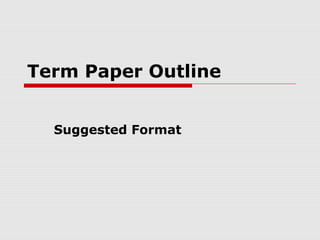Term paper outline
Here are some potential arguments that could be used to further support premise 3-4: - The supernatural is defined as being outside the natural world and its laws, so by its nature it cannot be directly observed or tested using the methods of natural science which are limited to observing the natural world. - For something to be empirically observed or tested, it must interact with the natural world in ways that leave observable and measurable traces. But if a supernatural designer exists outside the natural world and its laws, it would not interact with or affect the natural world in ways science can detect. - Science relies on naturalistic explanations and empirical evidence. But the existence of a supernatural designer is by definition beyond naturalistic explanations and not open to

Recommended
Recommended
More Related Content
What's hot
What's hot (9)
Viewers also liked
Viewers also liked (20)
Similar to Term paper outline
Similar to Term paper outline (20)
Term paper outline
- 1. Term Paper Outline Suggested Format
- 2. “Those who do not seriously consider their outline risk losing sight of the very clarity on which the term paper assignment will be judged.”
- 3. Outline Grading Criteria amount of detail amount of organization
- 4. This outline divides the paper by its two objectives: the Philosophers’ position that you must explain in detail your reasoned response to the position within the context of the Philosophers’ arguments.
- 5. I) Introduction a) Relevant internet quote b) Anecdote or other lead-in material c) Thesis Statement 1—Explanation of the philosophical issue. d) Restatement of the issue.
- 6. II) Additional clarification of terms, ideas, definitions, and concepts (examples) If you use an example, analogy, metaphor, etc., you must explain to the reader what conclusion to draw from it--do not leave it to the reader's imagination! Beware of rhetorical devices!
- 7. III) Argument for first philosopher's thesis (Statement 2) a) Statement and explanation of the philosopher’s thesis b) First Reason for philosopher’s thesis 1) Argument(s) defending first reason c) Second Reason for philosopher’s thesis 1) Argument(s) defending second reason d) Continue with rest of reasons and supporting arguments
- 8. IV) Argument for second philosopher's thesis (Statement 3) a) Statement and explanation of philosopher’s thesis b) First Reason for philosopher’s thesis 1) Argument(s) defending first reason c) Second Reason for philosopher’s thesis 1) Argument(s) defending second reason d) Continue with rest of reasons and supporting arguments
- 9. V) Argument for third philosopher's thesis (Statement 4) a) Statement and explanation of philosopher’s thesis b) First Reason for philosopher’s thesis 1) Argument(s) defending first reason c) Second Reason for philosopher’s thesis 1) Argument(s) defending second reason d) Continue with rest of reasons and supporting arguments
- 10. VI) Objections and Replies What do opponents say about these arguments and how do the authors reply?
- 11. VII) Student’s Thesis-- Explanation of your position on this issue (Statement 5) a) Clear statement and explanation of your view on the issue b) Clarification of your position c) No fence-sitting!!
- 12. VIII) Argument for your position on the philosophical issue a) Brief restatement of your view b) First Reason for your thesis 1) Argument(s) defending first reason B) Second Reason for your thesis 1) Argument(s) defending second reason C) Continue with rest of your reasons and supporting arguments
- 13. IX) Possible responses and objections to your position and your response Possible response from first philosopher Possible response from second philosopher Possible response from third philosopher Other possible responses or objections Your response to possible objection (if any)
- 14. X) Concluding Summary of the issue and your position.
- 15. An Example of Argument Analysis Distinguishing between main and supporting arguments!
- 16. Thesis Statement: “’Intelligent Design’ is not Science.” Clarification: The creationist-based theory known as “Intelligent Design” cannot meet basic empirical standards of science and so cannot be a basis for criticism of Evolutionary Theory.
- 17. Main Argument Premise 1) All scientific theories must be based on empirical observation. Premise 2) All scientific theories must provide clearly testable conclusions and results. Premise 3) “Intelligent Design” cannot be based on empirical observation nor provide clearly testable results.
- 18. Supporting Argument for Premise 1 1-1) “Science studies natural phenomena by formulating explanations that can be tested against the natural world.”—KSES 1-2) Natural phenomena can only be studied by empirical observation. 1-3) Therefore, all scientific theories must be based on empirical observation.
- 19. Supporting Argument for Premise 2 2-1) “Science studies natural phenomena by formulating explanations that can be tested against the natural world.”—KSES 2-2) Testing against the natural world must provide clear, testable results. 2-3) Therefore, all scientific theories must provide clearly testable conclusions and results.
- 20. Supporting Argument for Premise 3 3-1) “Intelligent Design” cites a cosmic designer as responsible for the Universe. 3-2) A cosmic designer cannot be part of that Universe. 3-3) So the cosmic designer must be super-natural. 3-4) The super-natural cannot be empirically observed or tested. 3-5) Hence “Intelligent Design” cannot be based on empirical observation nor provide clearly testable results.
- 21. Continuing Support in the Argument: Can you think of an argument for premise 3-4) “The super-natural cannot be empirically observed or tested”?